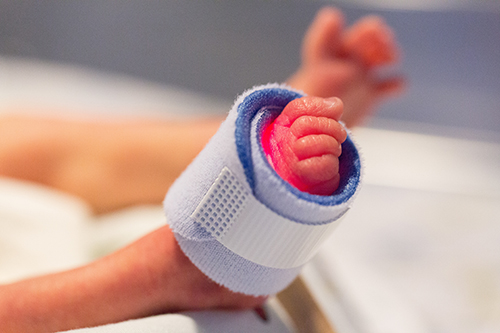
The success of PReCePT, a programme to increase the use of magnesium sulfate to prevent cerebral palsy in premature babies, has been highlighted in a study led by National Institute for Health and Care Research Applied Research Collaboration West (NIHR ARC West) researchers including from the University of Bristol.
The paper, published in BJOG: An International Journal of Obstetrics and Gynaecology, shares the findings of the Health Foundation funded PReCePT study, nested within the AHSN Network's national PReCePT (Prevention of cerebral palsy in pre-term labour) programme. It shows uptake of magnesium sulfate increased across all maternity units in England, regardless of whether they were given extra support.
The study, led by NIHR ARC West researchers, compared uptake in 27 maternity units under the standard programme with 13 units given an enhanced support package. Standard support included a PReCePT Quality Improvement (QI) guide and toolkit created by the West of England Academic Health Science Network (AHSN), support from local AHSNs and 90 hours of backfill for a midwife PReCePT champion. The enhanced support included the standard package plus unit-level QI coaching, a further 90 hours of midwife backfill and 104 hours of backfill for an obstetrics or neonatology lead, and other support.
The researchers found that in the year before the study started, 68% of eligible mothers in the control group and 64% of mothers in the enhanced support group received magnesium sulfate. After the study, this had gone up to 84% and 85% respectively. After adjusting for other factors, the two groups had improved by very similar amounts. The standard National PReCePT Programme (NPP) (control group) supported by AHSNs was the most cost-effective way to improve use of magnesium sulfate.
However, staff in the enhanced support group tended to understand the issues better and had better teamwork. This may be important because a 2022 review of poor care in the worst-performing maternity units in England found that a lack of teamwork was a significant contributory factor.
The research team also highlighted that the enhanced support package may have been the more realistically funded model, as many midwives put in extra time to support PReCePT.
In the paper they said: "This real implementation cost should not be underestimated in future improvement programmes. The high level of commitment, QI capacity and teamworking culture already present in some NPP units, and the high levels of interaction between trial arms (contamination), may also explain the overall similarity in outcome between groups."
Karen Luyt, Professor in Neonatal Medicine at the University of Bristol, Chief Investigator for PReCePT and Consultant Neonatologist at St Michael's Hospital, Bristol, said: "The PReCePT randomised controlled trail has given valuable insights into how new treatments should be implemented into routine NHS clinical practice and how teamwork may be improved in NHS teams providing perinatal care. An intervention that can improve teamwork, is likely to have far-reaching benefits across a broad range of perinatal outcomes."
Paper
'Quality improvement interventions to increase the uptake of magnesium sulphate in preterm deliveries for the prevention of cerebral palsy (PReCePT study): a cluster randomised controlled trial' by Hannah B. Edwards et al. in BJOG: An International Journal of Obstetrics and Gynaecology [open access]






